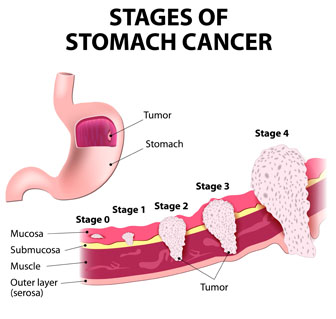WHEN you hear about cancer, it is often about someone who has been affected by lung or skin cancer.
However, stomach cancer is on the list of top 10 cancers in Singapore because of how overlooked it is. Too often, stomach cancer has progressed to the later stages by the time it is detected.
Statistics from the Singapore Cancer Registry’s annual report in 2015 indicate that stomach cancer is the 7th most common cancer in men, and the 9th most common in women.
Dr Eric Wee, Specialist in Gastroenterology at Nobel Gastroenterology Centre, said: “Despite stomach cancer being fairly common, few are aware that a common bacteria called Helicobacter pylori is the root cause of many of these stomach cancers. In fact, Helicobacter pylori is so strongly associated with stomach cancer that it is classified by the World Health Organization as a Group 1 carcinogen.
“This simply means that the H. pylori bacteria causes cancer.”
The risk of stomach cancer is increased by approximately 6 times with this infection.
It is believed that most H. pylori infections occur during childhood and an individual will then carry this bacterium within their stomach into adulthood. What is worrisome is, individuals who have this infection may have absolutely no symptoms. Over time, H. pylori can cause stomach ulcers and even stomach cancer.

How does H. pylori cause cancer?
“Research has shown that H. pylori damages the lining of the stomach, causing the normal cells to die. Over time, this leads to the development of a new layer of abnormal cells called gastric intestinal metaplasia. The risk of stomach cancer increases once gastric intestinal metaplasia is established,” explains Dr Wee.
Although stomach cancer may rank lower than lung cancer or prostate cancer in Singapore, it has a high mortality rate, being the 4th most common cause of cancer deaths in local men and the 5th most common cause of cancer deaths in local women.
“This largely suggests, most patients are already in their advanced stages of stomach cancer when detected and it is difficult to cure at the point of diagnosis. The cancer cells have spread beyond the stomach and surgery will not cure these patients,” says Dr Wee.
A study published in 2016 in the Journal of Clinical Gastroenterology analysed data from patients with stomach cancer symptoms and found that 54% of the stomach cancers were diagnosed at an advanced stage. This resulted in a low survival rate.
You Might Also Like To Read:
Maserati Levante — Beast In The Beauty
How do I know if I have stomach cancer?
It is important for the public to be aware of the symptoms of stomach cancer.
“These include pain which is located in the upper abdomen, either in the centre or to the left, unintentional weight loss, a loss of appetite and a feeling of fullness even after a small meal.
“Having these symptoms does not mean that one has stomach cancer; it does mean that one should consult a gastroenterologist, especially if the symptoms are present for more than a month,” shared Dr Wee.
“Individuals with a low blood count (anaemia) and those who experience bleeding from the digestive tract should also be evaluated by a doctor.”
How do I screen for H.pylori?
Stomach cancer can be cured if it is detected early. It is recommended that individuals with a family history of stomach cancer should be screened for H. pylori, a major risk factor for stomach cancer.
This can be performed with a blood test, stool test or a non-invasive urea breath test. “The urea breath test has a high sensitivity of over 95% and is superior to the blood test in predicting whether an infection is truly present,” explains Dr Wee.
How do I detect stomach cancer in its early stages?
In countries such as Korea and Japan where the incidence of stomach cancer is high,  endoscopy – using a thin flexible tube with a video camera mounted at the end – to check the stomach is recommended in individuals who are over 40 years old. Screening has been shown to reduce the risk of death from stomach cancer.
endoscopy – using a thin flexible tube with a video camera mounted at the end – to check the stomach is recommended in individuals who are over 40 years old. Screening has been shown to reduce the risk of death from stomach cancer.
The prevalence of stomach cancer in Singapore is lower than Korea and Japan, hence mass screening is not performed locally. “Individuals who have gastric intestinal metaplasia detected during a prior endoscopy should undergo regular stomach cancer screening, as their lifetime risk of stomach cancer is significantly higher,” says Dr Wee.
 The Healthy Way is a regular health series developed for STORM.SG by Healthway Medical. If you have specific queries, please do email us at health@storm.sg and we will ask the panel of experts for their advice. Do note that only selected queries will be addressed.
The Healthy Way is a regular health series developed for STORM.SG by Healthway Medical. If you have specific queries, please do email us at health@storm.sg and we will ask the panel of experts for their advice. Do note that only selected queries will be addressed.
In a 10-year study on more than 1,000 patients, it was revealed that endoscopic screening of the stomach can reduce the risk of death from stomach cancer by as much as 40% in high risk individuals.
With the constant advance of medical science, Singapore is contributing to the body of research findings.
MicroRNA biomarkers, a novel blood test for stomach cancer is currently being evaluated in clinical trials. In the future, these biomarkers could be used by doctors to screen individuals for stomach cancer.
Till then, those who have gastric intestinal metaplasia, or chronic gastric problems should consider an endoscopic examination of their stomach. It is recommended that those who have a family history of stomach cancer should consider screening themselves for H. pylori infection.























